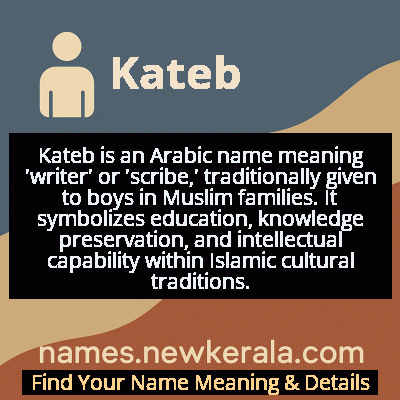Kateb Name Meaning & Details
Origin, Popularity, Numerology Analysis & Name Meaning of Kateb
Discover the origin, meaning, and cultural significance of the name KATEB. Delve into its historical roots and explore the lasting impact it has had on communities and traditions.
Name
Kateb
Gender
Male
Origin
Muslim
Lucky Number
3
Meaning of the Name - Kateb
Kateb is an Arabic name meaning 'writer' or 'scribe,' traditionally given to boys in Muslim families. It symbolizes education, knowledge preservation, and intellectual capability within Islamic cultural traditions.
Kateb - Complete Numerology Analysis
Your Numerology Number
Based on Pythagorean Numerology System
Ruling Planet
Jupiter
Positive Nature
Optimistic, inspirational, and creative.
Negative Traits
Scattered, exaggerating.
Lucky Colours
Yellow, gold, purple.
Lucky Days
Thursday.
Lucky Stones
Yellow sapphire.
Harmony Numbers
1, 2, 9.
Best Suited Professions
Arts, writing, communication.
What People Like About You
Creativity, optimism.
Famous People Named Kateb
Kateb Yacine
Writer, Playwright
Revolutionized Algerian literature with his novel 'Nedjma' and contributed significantly to post-colonial African writing
Kateb Mustafa
Scholar, Historian
Preserved important Ottoman historical records and contributed to Islamic scholarly traditions
Kateb al-Warraq
Scholar, Copyist
Maintained one of the most significant libraries in medieval Baghdad and advanced Islamic scholarship
Kateb Cheikh
Religious Scholar
Modern interpreter of Islamic texts and advocate for contemporary religious education
Name Variations & International Equivalents
Click on blue names to explore their detailed meanings. Gray names with will be available soon.
Cultural & Historical Significance
In modern Muslim societies, the name continues to carry strong educational and intellectual connotations. It symbolizes the Islamic tradition of valuing knowledge and literacy, reflecting the Quran's emphasis on learning and writing. Families choosing this name often do so to honor this intellectual heritage and express aspirations for their children's educational achievements. The name serves as a reminder of Islam's rich literary tradition and the importance of preserving cultural knowledge through writing and scholarship across generations.
Extended Personality Analysis
Men named Kateb typically demonstrate intellectual depth and a natural affinity for learning and communication. They often exhibit careful, analytical thinking patterns and show remarkable attention to detail in their endeavors. Their name's association with writing and record-keeping frequently manifests in organized approaches to life, clear expression of ideas, and a preference for structured environments where their methodical nature can thrive. These individuals are often perceived as thoughtful, observant, and reflective, with a strong sense of responsibility toward preserving and sharing knowledge.
In interpersonal relationships, Katebs tend to be reliable and trustworthy, often serving as confidants or advisors within their social circles. They typically approach challenges with patience and determination, showing particular strength in situations requiring careful analysis and documentation. While they may appear reserved in unfamiliar settings, they reveal considerable warmth and dedication to those they trust. Their connection to the name's scholarly heritage often drives them toward careers in education, research, writing, or information management, where their natural talents for organization and clear communication can achieve full expression.
Modern Usage & Popularity
In contemporary Muslim communities, the name Kateb maintains a respectable presence, particularly among families with strong educational values and appreciation for cultural heritage. While not ranking among the most popular names, it enjoys consistent usage across generations, especially in North African countries like Algeria and Morocco where literary traditions remain influential. The name has experienced modest resurgence in recent years as Muslim parents seek names that reflect intellectual aspirations while maintaining cultural authenticity. Its usage is particularly notable among urban, educated families who value the name's historical significance and its connection to Islamic scholarly traditions. The name continues to be chosen by parents who wish to instill values of learning, precision, and cultural preservation in their children.
Symbolic & Spiritual Meanings
The name Kateb carries rich symbolic meaning rooted in its association with writing and record-keeping. It represents the human capacity to preserve knowledge, document history, and create lasting legacies through the written word. Symbolically, it connects to concepts of memory, tradition, and the transmission of culture across generations. In Islamic context, the name evokes the symbolic 'Preserved Tablet' (al-Lawh al-Mahfuz) where divine decrees are recorded, adding spiritual dimension to its meaning. The name also symbolizes the bridge between thought and expression, idea and implementation, serving as a metaphor for bringing abstract concepts into tangible reality through careful documentation and communication.

